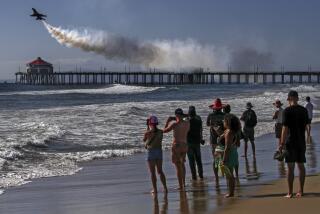Officials Seek Details About Offshore Pipe : Lease: At least one Huntington Beach council member wants to halt offshore operations, but the city’s hands may be tied by an agreement with the pipeline owner.
- Share via
HUNTINGTON BEACH — Infuriated at the oil spill and worried about the possibilities of another, city officials said Wednesday that they are looking into the source of the problem: an offshore oil-loading pipe.
They say the pipeline brings only about $35,000 revenue a year into municipal coffers under the current lease agreement. The city has leased onshore land for the pipeline since 1956.
Many officials, including some members of the City Council, said they knew little about the land-lease agreement for the pipeline until the American Trader ruptured a tank Feb. 7 and spilled nearly 400,000 gallons of oil.
Now the City Council wants to know everything about the pipeline, which is used by tankers to offload oil about two miles from the city’s beach. Mayor Thomas J. Mays said the council, at its meeting Tuesday night, asked for detailed information from the staff and City Atty. Gail C. Hutton.
At least one council member, Grace Winchell, is on record as wanting an end to the offshore oil operations. But Mays said the city’s hands may be tied by the franchise agreement with Golden West Refining Co., owner of the pipeline.
“We have a legal agreement on the pipe that doesn’t expire until the year 2005,” Mays said.
According to the State Lands Commission, Huntington Beach is the only city in Orange County that has such an offshore oil-loading pipe.
“It’s a vestige of the past,” said Winchell, referring to the offshore pipeline. “Having something like this today, with the city’s new image of being a recreation attraction and visitor center, is just not appropriate.
“I’m opposed to offshore oil drilling, and something like this (pipe) seems to me to be in a similar category. It’s just not appropriate for the California coast.”
Councilman John Erskine said Wednesday that he has asked for a closed session next Tuesday night during which attorneys could brief the City Council on legal aspects of the offshore pipeline.
“I’ve asked for a closed session to determine the legal liabilities and indemnity agreement between the franchisee and the city,” Erskine said.
Erskine said he had “concerns about the environmental effect” of the offshore pipeline. But he said that pending more investigation, he is not calling for an end to the pipeline.
“I’m not going to go that far,” he said. “There are enough politicians out there falling all over themselves making statements about this spill.”
Mays said he thinks the pipeline situation should be discussed, as much as possible, during the public portion of the City Council meeting on Tuesday.
“I think the public is very interested in this,” he said. “We need to know what options we have. We also have to know what economic impacts there may be to refineries that get this oil. We have to deal with this situation in more than just an emotional manner.”
But Mays said he has concerns about the environmental hazards associated with the offshore pipeline.
“It’s not only our city that’s affected,” he noted. “This current spill is affecting Seal Beach and Newport Beach. So we have a broader responsibility in this than just to Huntington Beach.”
Charles Warren, executive officer of the State Lands Commission, said in Sacramento on Wednesday that the commission has final jurisdiction over offshore pipelines. Asked if the commission is thinking of seeking an end to the Huntington Beach offshore pipe, Warren said, “I can’t say yes or no to that right now.” He said the commission is still investigating the oil spill in Huntington Beach.
According to commission records, there are 11 offshore oil-loading pipes--officially called marine terminals--in coastal waters from San Luis Obispo County to the Mexican border.
Commission officials said the only marine terminal in Orange County is the one at Huntington Beach.
There are two marine terminals in San Luis Obispo County; four in Santa Barbara County; two in Ventura County; one--at El Segundo--in Los Angeles County, and one--at Carlsbad--in San Diego County.
Warren said the State Lands Commission, which has jurisdiction over beach lands from the high tide line to three miles at sea, has had concern about the use of marine terminals.
“In the past eight years, we’ve been giving increased attention to the marine terminals and their operation,” he said. “We’ve made sure that the marine terminals have operating manuals on oil containment and also the ability to handle oil spills.”
More to Read
Sign up for Essential California
The most important California stories and recommendations in your inbox every morning.
You may occasionally receive promotional content from the Los Angeles Times.









